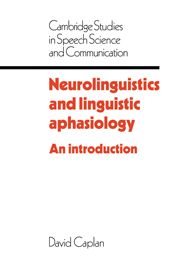Book contents
- Frontmatter
- Contents
- Preface
- Part I Introduction
- Part II Clinical aphasiology and neurolinguistics
- 3 The discoveries of Paul Broca: localization of the “faculty for articulate language”
- 4 Classical connectionist models
- 5 Extensions of connectionism
- 6 Objections to connectionism
- 7 Hierarchical models
- 8 Global models
- 9 Process models
- 10 Overview of clinical aphasiology and neurolinguistics
- Part III Linguistic aphasiology
- Part IV Contemporary neurolinguistics
- References
- Author index
- Subject index
6 - Objections to connectionism
Published online by Cambridge University Press: 10 December 2009
- Frontmatter
- Contents
- Preface
- Part I Introduction
- Part II Clinical aphasiology and neurolinguistics
- 3 The discoveries of Paul Broca: localization of the “faculty for articulate language”
- 4 Classical connectionist models
- 5 Extensions of connectionism
- 6 Objections to connectionism
- 7 Hierarchical models
- 8 Global models
- 9 Process models
- 10 Overview of clinical aphasiology and neurolinguistics
- Part III Linguistic aphasiology
- Part IV Contemporary neurolinguistics
- References
- Author index
- Subject index
Summary
The classical connectionist theories described in Chapter 4 were not without their critics. Indeed, it is an indication of their importance that they were subject to so many attacks; unimportant theories are ignored. In many ways, the debate about connectionist models dominated neurolinguistic theory for over a century. Some reconstructions of the history of neurolinguistics and aphasiological research essentially divide theories of language–brain relationships into two groups – the “localization” camp, of which the connectionists are the prime examples, and the “holist” camp, which includes virtually all other investigators. This dichotomy is over-simplified. First, there are many aspects of the connectionist models, such as their commitment to certain linguistic and psycholinguistic levels of description, which were taken over by at least some of their critics. Second, as we have seen in instances such as the “concept center” postulated by Lichtheim, not all aspects of the connectionist models were thought to be localized. Moreover, as has been stressed by Geschwind (1964), though the critics disagreed with the connectionists about the psychological nature of language and its processing, they were largely in agreement about the nature, classification, and pathological determinants of language breakdown. Moreover, it is an error to group together all those who disagreed with the connectionists, since there are a variety of positions which these theorists maintained.
- Type
- Chapter
- Information
- Neurolinguistics and Linguistic AphasiologyAn Introduction, pp. 79 - 88Publisher: Cambridge University PressPrint publication year: 1987

